In the realm of canine health, the prevalence of periodontal disease in dogs is a pressing issue that necessitates meticulous attention. The significance of preventive measures cannot be overstated in safeguarding our furry companions' oral hygiene.
By proactively addressing this condition through early detection and tailored preventive strategies, pet owners can significantly reduce the risk of periodontal disease progression.
The discussion on the best defense against this ailment delves into a comprehensive approach encompassing regular dental care, professional interventions, and the overarching importance of ongoing maintenance to ensure optimal dental health for dogs.
Key Takeaways
- Daily brushing and regular cleanings are crucial for preventing periodontal disease in dogs.
- Early detection through professional exams helps address dental issues before they worsen.
- Antimicrobial products and chew toys can aid in maintaining good oral health for dogs.
- Consult a vet for guidance on dental care to ensure the best defense against periodontal disease.
Understanding Periodontal Disease in Dogs
Periodontal disease in dogs, characterized by the progression from gingivitis to advanced stages involving tartar buildup and red, swollen gums, necessitates timely intervention to prevent further complications. Gingivitis initiates with plaque accumulation, which can evolve into hardened tartar if not addressed promptly. Common symptoms include bleeding gums and discomfort while eating.
As the disease advances, it may lead to tooth loss, abscesses, and systemic health issues. Anesthesia is often required for a thorough examination and treatment. Dental scaling, antibiotics, and in severe cases, surgical therapy, are typical interventions.
Regular dental care, both professional and at-home, is crucial to maintaining a dog's oral health and overall well-being. Vigilance and proactive management are key in combating periodontal disease in dogs.
Symptoms and Detection of Dental Disease
Effective detection of dental disease in dogs relies on recognizing subtle signs that may indicate underlying oral health issues, emphasizing the importance of proactive monitoring and regular veterinary assessments. Signs such as bad breath, avoidance of head touches, sneezing, and bloody saliva can point to potential dental problems. Receding gums are also a common symptom that should not be overlooked. Early detection through professional cleanings and x-rays is crucial in identifying dental issues before they progress. Regular home cleanings and veterinary check-ups play a significant role in maintaining optimal oral health for dogs.
| Signs of Dental Disease in Dogs |
|---|
| Bad breath |
| Avoidance of head touches |
| Sneezing |
| Bloody saliva |
| Receding gums |
Prevention and Maintenance of Dental Health
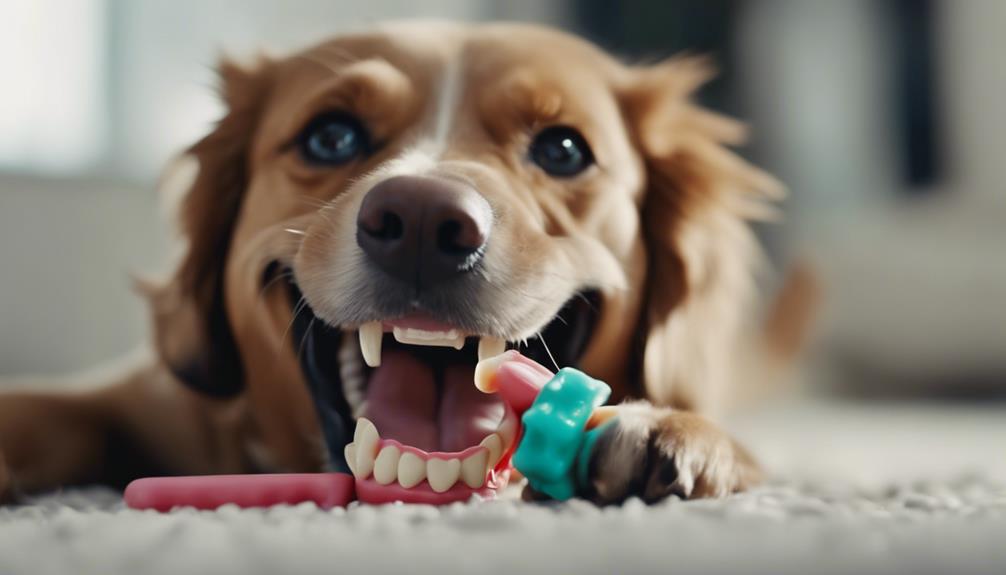
To ensure optimal oral health for dogs, it is imperative to prioritize daily brushing and regular teeth cleanings as essential components of preventive care. Daily brushing helps remove plaque and prevent tartar buildup, reducing the risk of gingivitis and periodontal disease.
Additionally, incorporating antimicrobial products and providing appropriate chew toys can aid in maintaining dental health. Genetic predisposition may also play a role, emphasizing the importance of consulting a veterinarian for personalized guidance on dental care.
Cost and Care for Dog Teeth Cleaning
When considering the maintenance of oral hygiene for dogs, the cost and proper care associated with professional teeth cleaning play a crucial role in preventing dental issues. Professional cleaning costs can vary based on the extent of cleaning required and the clinic's location.
However, it is important to note that periodontal disease can recur quickly post-cleaning if proper follow-up care is not maintained. At-home cleanings, including daily brushing, are critical for disease control and overall dental health.
Additionally, incorporating chew toys and a balanced diet can help in maintaining good oral hygiene for dogs. Seeking guidance and resources from a veterinarian can provide valuable insights into effective dental care practices for your furry companion.
Importance of Early Detection
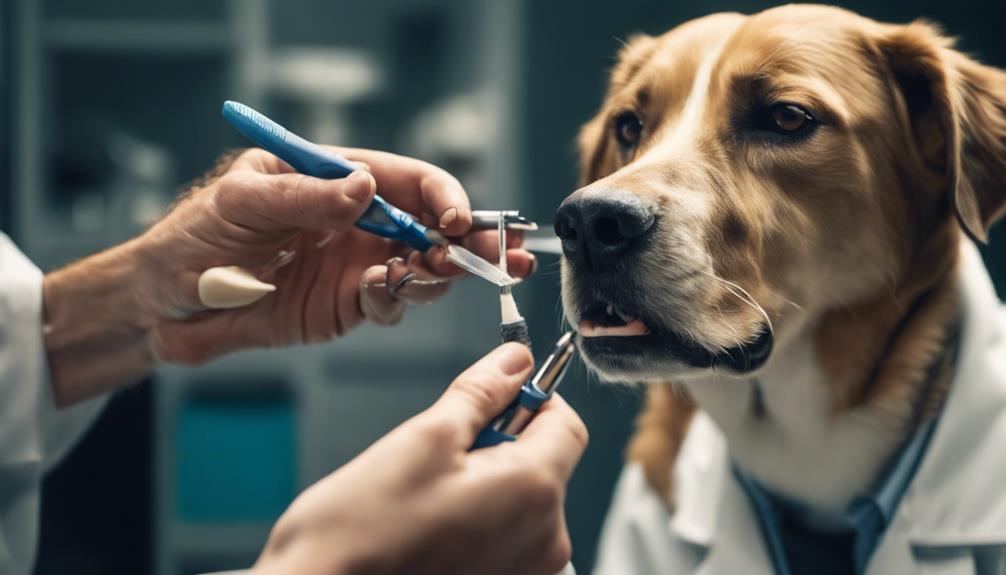
Recognizing the signs of dental disease in dogs at an early stage is crucial for effective preventive care and treatment. Early detection allows for prompt intervention, which can help prevent the progression of gingivitis to more severe periodontal disease.
Signs such as bad breath, swollen gums, and avoidance of head touches should not be ignored. Professional cleanings and regular veterinary check-ups play a vital role in identifying dental issues early on. X-rays can reveal hidden problems that may not be visible during a routine exam.
Role of Daily Brushing
Implementing a daily brushing routine is essential for maintaining optimal dental health in dogs. Daily brushing helps prevent plaque buildup, reduces the risk of gum disease, and promotes overall oral hygiene. For effective brushing, consider these key points:
- Consistency: Regular brushing ensures ongoing plaque removal and reduces the likelihood of dental issues.
- Technique: Use a soft-bristled toothbrush and pet-safe toothpaste to gently clean your dog's teeth and gums.
- Reward System: Positive reinforcement after brushing sessions can make the experience more enjoyable for your dog and encourage cooperation.
Professional Cleanings and X-rays
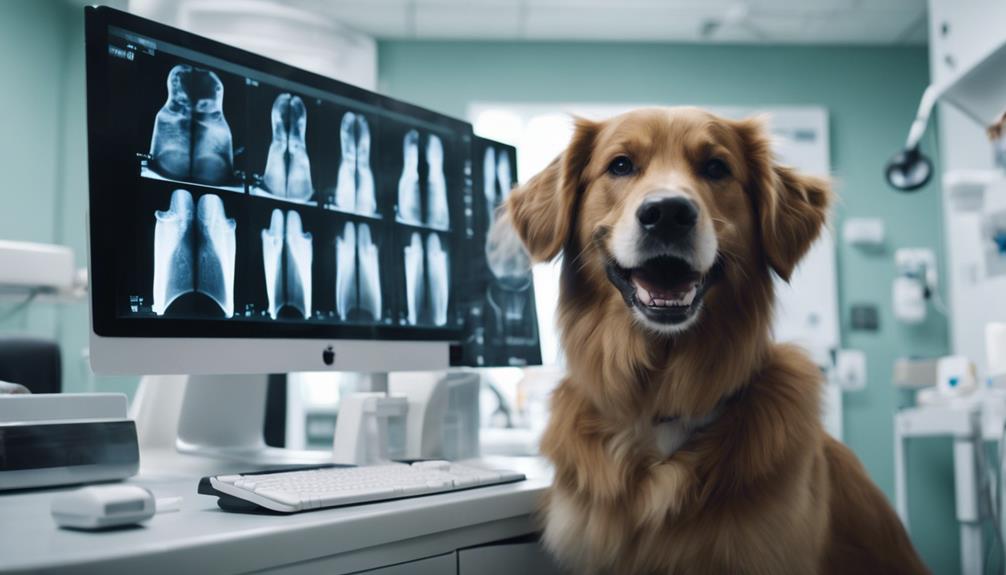
Professional cleanings performed by qualified veterinary professionals are crucial for maintaining the dental health of dogs and ensuring early detection of potential issues. These cleanings involve the removal of plaque and tartar that can lead to periodontal disease if left untreated.
Additionally, dental x-rays play a vital role in identifying underlying dental problems such as tooth decay, fractures, or root issues that may not be visible during a routine examination. X-rays help in diagnosing issues early on, allowing for prompt treatment and preventing further complications.
Regular professional cleanings and x-rays are essential components of a comprehensive dental care plan for dogs, promoting overall oral health and well-being.
Use of Chew Toys
The incorporation of chew toys can significantly contribute to maintaining a dog's dental health and promoting oral hygiene. Chew toys help reduce plaque and tartar buildup, stimulate gum health, and prevent boredom and anxiety in dogs.
To maximize the benefits of chew toys for your dog's dental health:
- Choose the Right Type: Opt for dental-specific chew toys designed to clean teeth and massage gums.
- Supervision is Key: Monitor your dog while they chew to prevent accidental ingestion or choking hazards.
- Rotate and Replace: Regularly switch out old chew toys to ensure effectiveness and prevent bacterial growth.
Explore Articles on Oral Health
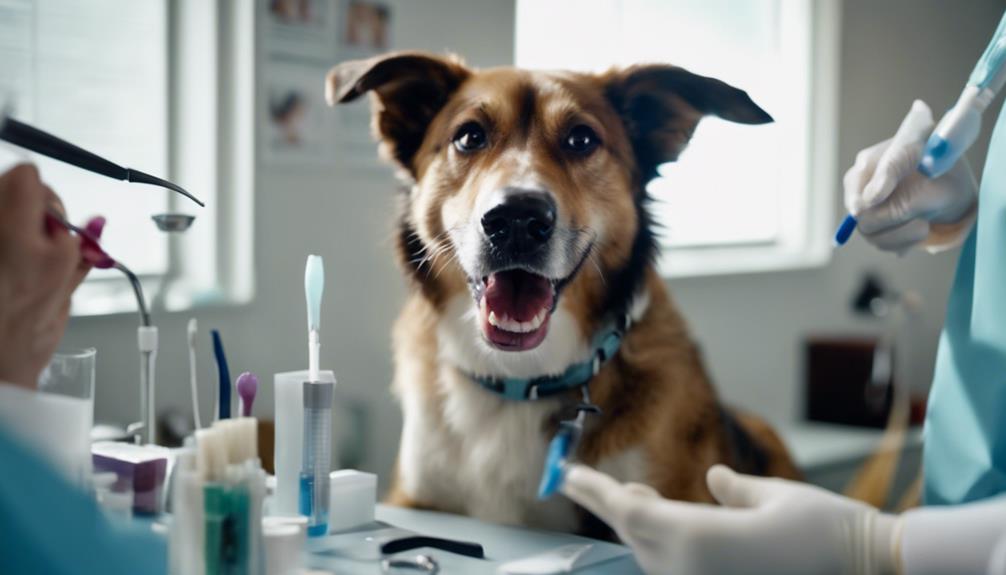
To further enhance your understanding of maintaining optimal oral health for your canine companion, exploring articles on oral health can provide valuable insights and guidance. Articles covering topics such as tooth decay prevention, proper teeth cleaning techniques, the importance of professional cleanings, and the role of diet in dental health can offer comprehensive information on keeping your dog's mouth healthy.
These resources can also delve into the significance of early detection of dental issues, the benefits of regular veterinary check-ups, and the use of dental treats and chew toys for oral hygiene. By exploring a variety of articles on oral health for dogs, pet owners can gain a deeper understanding of how to prevent periodontal disease and ensure their furry friend's overall well-being.
Tooth Decay Prevention Tips
Implementing effective oral hygiene practices is key to preventing tooth decay in dogs. Proper care can help maintain your furry friend's dental health and overall well-being. To ensure your dog's teeth stay strong and healthy, consider the following tips:
- Daily Brushing: Regularly brushing your dog's teeth can help remove plaque and prevent tartar buildup.
- Dental Treats: Providing dental chews or toys designed to promote oral health can aid in reducing plaque and freshening breath.
- Regular Veterinary Check-ups: Scheduling routine dental exams with your veterinarian can help detect any dental issues early on and ensure timely intervention.
Cat Dental Exams Importance
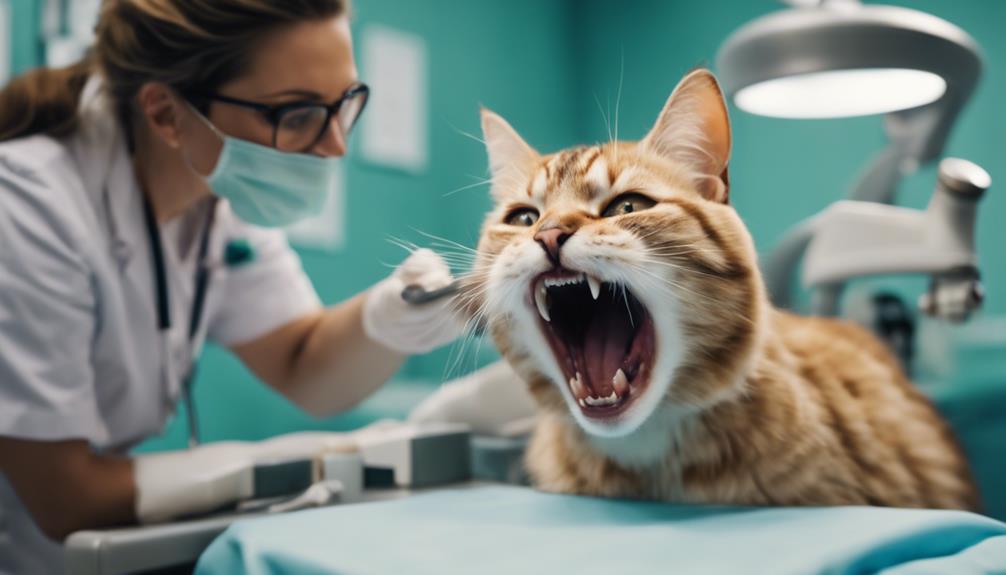
Ensuring regular veterinary dental examinations for cats is paramount in maintaining their oral health and preventing potential dental issues. Cats, like dogs, are prone to dental problems that can impact their overall well-being. Regular check-ups can help detect issues early, leading to timely intervention and treatment. Below is a table highlighting the importance of cat dental exams:
| Benefits of Cat Dental Exams | Importance |
|---|---|
| Early detection of dental issues | Helps prevent progression of dental diseases |
| Professional cleaning | Removes plaque and tartar buildup |
| Assessment of oral health | Identifies potential problems such as gingivitis |
| Tailored treatment plans | Ensures appropriate care for individual cat's dental needs |
Dental Treats for Oral Hygiene
Regular dental care for pets extends beyond professional cleanings and check-ups to include the use of dental treats specifically designed to promote oral hygiene. These treats can be a valuable addition to your dog's oral care routine, helping to reduce plaque and tartar buildup while freshening their breath.
When choosing dental treats for your pet, consider the following:
- Ingredients: Opt for treats with dental benefits like plaque and tartar control properties.
- Size and Texture: Choose treats that are appropriately sized for your dog and have a texture that helps in cleaning their teeth.
- Veterinary Approval: Always consult with your veterinarian to ensure the dental treats you choose are safe and effective for your pet's oral health.
Vet Advice on Pet Dental Care
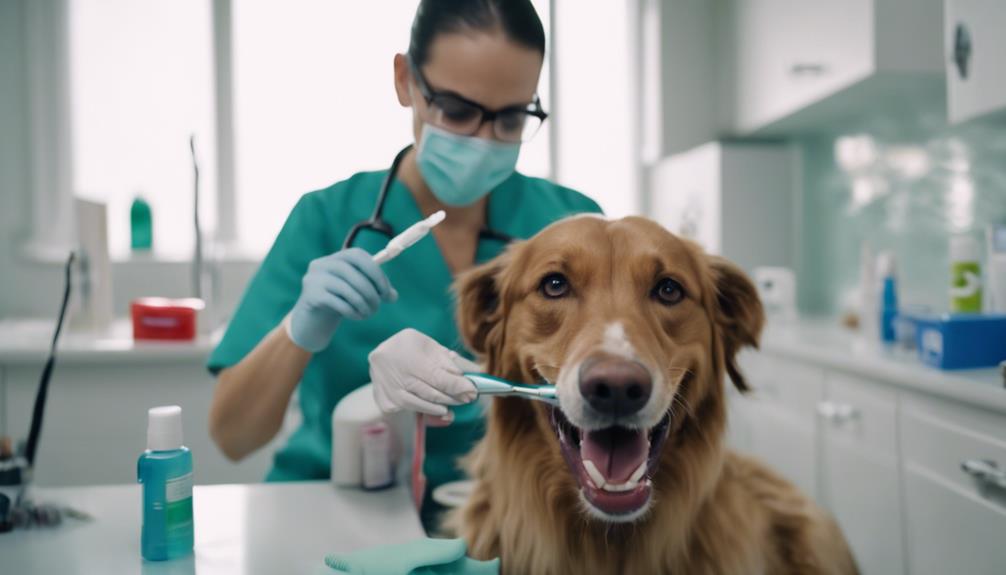
Veterinarians play a crucial role in providing expert guidance on effective dental care practices for pets. Seeking advice from a vet can help pet owners navigate the complexities of maintaining their furry companions' oral health. Here is a helpful table summarizing key points from vet recommendations:
| Vet Advice on Pet Dental Care | Key Points |
|---|---|
| Daily Brushing | Essential for plaque prevention |
| Regular Check-ups | Vital for early detection of dental issues |
| Professional Cleanings | Necessary for thorough tartar removal |
| Dental Diets/Chews | Aid in reducing plaque and tartar buildup |
Conclusion
In conclusion, proactive prevention measures play a crucial role in combating periodontal disease in dogs. Understanding the symptoms, early detection, and implementing regular dental care regimens are essential in maintaining optimal oral hygiene for our canine companions.
By prioritizing dental health and seeking professional veterinary advice, pet owners can effectively safeguard their pets from the detrimental effects of dental disease.




